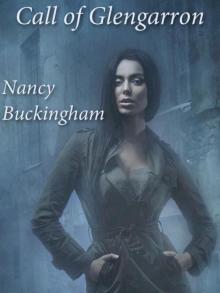- Home
- Nancy Buckingham
Shroud of Silence
Shroud of Silence Read online
SHROUD OF SILENCE
Nancy Buckingham
Chapter One
Already, on the drive down, I was wishing I hadn’t agreed to go to Mildenhall. I’d said as much, more than once.
Gwen Barrington clearly expected to handle people just as she handled her minicar—forcefully, with determined authority. Goggle-eyed in huge black-rimmed spectacles, she briskly demolished my every objection.
“Don’t worry, Kim dear. I keep telling you, Drew will be delighted when we explain our little plan to him.”
“But suppose he isn’t? And what about his wife?” I let my anger spill into my voice. “Naturally, I expected you to have arranged it all with your nephew before we came down here.”
Gwen shrugged me off, prodding her glasses more firmly to her nose. “Can you imagine any parents not wanting everything possible done for their offspring?”
I sighed. “That’s not the point—”
“That is the point,” she chopped in. “The poor child badly needs help. And you can give it to her, Kim.”
“Only with her parents’ active cooperation.”
“You’ll get that, all right.”
She swung off the main road, and we were at once lost to the traffic in a maze of wooded Sussex lanes in country unexpectedly remote, covered with a golden hush of autumn leaves. Occasional breaks in the trees teased me with brief views of intimate valleys and a line of misting hills beyond.
But I was too fed up to enjoy it. “You’ve put me in an impossible situation, Gwen. I’ll feel like a gatecrasher.”
“You’ll be my guest,” she said sharply. “Don’t forget that Mildenhall is my home, too.”
“All the same ...”
“It’s Jane who’s got the stammer, poor kid. Not her mother and father.”
There was plenty more I could have said, but Gwen had scored a shrewd point. Her nephew’s child evidently had a serious speech difficulty, and I had the qualifications to deal with that sort of thing. In some curious way, some tenuous way, it already made a bond between me and the unknown little girl. I wanted to help her, if I could. And what was the use of all my specialized training if I couldn’t get around a couple of unenlightened parents?
I might as well go along and assess the case, I decided. Take a look at the problem I was being asked to solve.
It was too late, anyway, to dodge a meeting now. A sign showed me we had arrived at Mildenhall. The house itself was out of sight, buried somewhere down the fir-treed slope.
Changing gear, Gwen flashed me a long-toothed grin. “It’ll all work out, Kim, you’ll see. The family is used to my little ways by now.”
That didn’t reassure me one bit, but I let it ride. I needed these last remaining seconds to arrange a carefree smile. Jane might be around, and first impressions meant such a lot.
We hairpinned into the steeply pitched drive, and immediately lost the afternoon sun. As we drove, we were dwarfed between high earth banks and blackly green rhododendrons. Another tight, bend, and yet another,
the engine moaning in low gear. The drive still plunged on, but we branched off to a circular forecourt, shadowed and damp. I noticed a peaty smell as we got out of the car.
Mildenhall loomed over us, a solid square block of graying stonework. Its delicate Regency outline sprouted eccentric Victorian afterthoughts.
Gwen grabbed my suitcases, one in each hand, as if she thought I might turn and make a run for it. She marched me through the columned portico, shouldered open the front door, and led the way into a. dim and rather cavernous hall.
“Anybody home?”
Her bellow only dented the silence briefly. Nobody answered; nobody came running.
She dumped my luggage at the foot of the staircase. “I don’t know where the devil you’ll be sleeping. Tansy sees to all that.”
“Tansy?”
“My sister. She runs the place for Drew.”
“What about his wife?” I asked indiscreetly, because I wanted to know.
Gwen boomed with delighted laughter. “Corinne is not exactly the domesticated type, my dear.” She went on ahead toward double doors on the far side of the hall. “Come along, let’s see if we can rustle up some tea.”
We passed from monochrome into glowing technicolor. Huge windows let in the fullness of the afternoon sun. Everything in the room, regardless of hue, took on the mellow warmth of amber.
“What a lovely room!” I exclaimed.
Gwen sniffed as she pressed a bell by the white marble fireplace. “Damned cold in winter, though, even with all the radiators going full blast.”
She wandered about restlessly, taking off her short suede car coat and tossing it over the back of a chair.
“Sling your coat down for a minute, Kim, unless you want to go upstairs and titivate and whatnot.”
“No, but—”
The door behind us opened. A tiny woman stood there, thin as wire and tough as wire. She regarded us mildly.
“You took your time, Pinky,” barked Gwen, grinning fiercely.
“I didn’t want to miss the end.”
This mysterious reply seemed to satisfy Gwen. “What about some tea?”
“It won’t be a minute, lovey. I’ve got the kettle on ready. Being Friday I said to myself when I heard the bell go, “That’ll be Miss Gwen,” I said.
“Don’t the others drink tea, then?” asked Gwen ironically.
“They don’t usually ring for it,” retorted Pinky. As she slipped out of the room, she added, “I’ll make a big pot, while I’m about it.”
Gwen strolled over to the wide open windows, and I followed. We stepped out to a paved terrace dotted with white-painted chairs and tables. It stretched away from us on either side, running the full width of the house. A dozen feet below, down a grass bank, was a big square lawn; beyond that a dark green fern of conifer forest hemmed the garden in.
We both swung round as we heard footsteps. A man came into view up a flight of steps at the far end of the terrace, a tallish man with dark hair touched already with gray. He wore dirty fawn slacks and a white open-necked shirt that needed a laundry.
He’d certainly seen us, but clearly hoped he needn’t admit to it. He would have slid away round the side of the house if Gwen hadn’t called him over.
“Hey, Drew. Come here.”
He held his arms up limply, displaying the all-over grime. “I can’t, Gwen. Not like this.”
Insubordination!
“Come on,” she bossed. “Kim won’t mind, will you, dear?”
He obeyed with weary reluctance. I could see that Gwen Barrington’s nephew hadn’t the least interest in meeting this visitor she’d brought to the house. When later he discovered I’d steamed in under a false flag, he was going to be justifiably annoyed. Even if he agreed to my taking on his daughter’s case, could I hope for his wholehearted support? And if Jane so much as scented that her father had reservations about me, then we’d get nowhere. His confidence, or lack of it, would at once become hers.
Drew Barrington exhibited a hand he considered too grubby to offer me. I reached out and took it without hesitation.
“Good afternoon, Mr. Barrington.”
“Good afternoon, Miss ... ?”
“Bennett. Kim Bennett.”
“You might just as well call her Kim from the start,” said Gwen jovially.
He passed up that suggestion. After a brief search for inspiration he volunteered “Welcome to Mildenhall, Miss Bennett.”
He struck me as a somber man, a silent man, locked up in his own dark thoughts. He seemed scarcely aware of me.
“Have some tea with us, Drew,” Gwen urged.
“I can’t, not like this,” he repeated. It was no more than a convenient
escape from something that would bore him.
Behind us, Pinky was wheeling in a trolley almost as tall as herself. “It’ll be too chilly out there,” she called. “You’d better come inside for your tea. There’s plenty for you too, Mr. Drew.”
His smile at her was the first touch of warmth he’d shown. “All right, Pinky, just a cup. Then I must go and get changed.”
He accepted the tea Gwen poured out for him, and stood with it in the doorway. He was deliberately keeping himself aloof, and I wondered how I could crack his shell enough to register with him. That at least would be a start, something to build on. But before I could polish up a few appropriate words, we were interrupted.
Off stage, a woman’s voice came ringing through the open window. Though nicely modulated, it was spoiled by sour overtones.
“Drew, what do you think you’re doing? The drawing room is hardly the place ...”
The speaker came into view. She saw that Gwen and I were in the room, but she pretended not to notice.
“I don’t know why you always insist on getting yourself so filthy, Drew. What are the workmen paid for?”
“Corinne,” he said quietly, “Please!”
Drew Barrington’s wife was a fabulous glowing redhead with slate-green eyes. She seemed to have everything just so—the right height, the right groovy statistics. Her pale pink linen suit showed the dress sense of a model and the money, apparently, to indulge it.
But there was one vital thing she hadn’t got, the love of her husband. No gift of second sight was needed to tell me that. And she seemed intent upon goading the poor man into a demonstration of actual dislike.
Belatedly, she chose to acknowledge Gwen’s presence, though she still ignored me.
“Oh, hello, Gwen—you’ve got here, then?” she said ungraciously. “I’m always having to tell Drew that if he must play about with those damned fish of his, he needn’t bring the smell into the house.”
I could see that Gwen found nothing remarkable in the unsavory little scene. Equably she reached for another cup and filled it for Corinne.
“This is Kim Bennett,” she said.
Those green eyes swung round to me at last. I was awarded a fullsquare insolent stare.
“Bennett? Oh yes, wasn’t it your sister who worked for Gwen in some way or other? The one who’s just died?”
Silly to let her stab a sudden pain! I smothered my hurt in layers of insincere charm.
“Yes, that’s right, Mrs. Barrington. Hilary was my sister.”
But Corinne wasn’t going to make it easy for me. “She was doing quite well for herself, I believe. I expect you’ll be wanting to take over her job for yourself now.”
I replied evenly that there was no question of that because I had my own career. This, I felt, was giving Gwen a handy lead-in to telling Jane’s parents that I was a speech therapist, and why she’d brought me down to Mildenhall.
To my surprise she let the opportunity slide. She expanded into talk about her Victoriana boutique in Chelsea, praising Hilary’s work as her assistant. Though naturally delighted to hear Gwen speak so warmly of my sister, I wished to heaven she’d get to the point about me.
Drew went off to change and still nothing had been said. I felt furious. I’d not come down here to spend a lazy weekend in the country, as Gwen was implying more and more strongly with every unexplained minute that passed. And I was in no mood to make idle conversation with a woman like Corinne Barrington.
“Perhaps I could go to my room now,” I said. “I’d rather like to freshen up.”
Corinne didn’t trouble herself to answer, shrugging off any involvement with my welfare,
“We’d better go and dig out my sister then,” said Gwen. She looked across at Corinne, “Any idea where Tansy might be?”
“With Jane, I imagine.” Corinne picked up a magazine and turned her back on us.
Following Gwen upstairs, I decided that an off-the-record look at the little girl might be useful. I would be able to judge whether or not I could help Jane. So far, from what I’d seen of her parents and the poisonous atmosphere between them, the outlook wasn’t very promising.
A heavy ivy-leaf wallpaper darkened the gloomy staircase. The treads, bare polished mahogany, were hollowly clippety-clop. Not a warm sound.
“What did your nephew’s wife mean about the fish?” I asked inquisitively, aiming to learn all I could as soon as I could.
Gwen chuckled. “Just Corinne being bitchy—as usual. But it’s the fish that keeps Mildenhall going these days. You can’t make a living out of fifty acres of woodland, which was all that was left by the time the place came to Drew.”
I prodded her into details.
“Drew runs a trout farm, dear,” she explained. “He breeds the little blighters for restocking fishing rivers. And for the table, too—he sells them to hotels all along the south coast. He’s beginning to do well now, but it’s been a struggle.”
We’d passed the second floor and were continuing up a rather less imposing staircase. From above I could hear happy laughter; high-pitched female laughter, a child’s giggle. In this gaunt house it made a pleasant change.
“Tansy is devoted to Jane,” said Gwen as she threw open a door.
The playroom was long and narrow, with attic ceilings sloping to a dormer window. Just now the sun made it seem bright.
Tansy was utterly unlike her sister. She was a small, thin woman and looked older than I guessed she actually was. Fifty-five looking sixty-five, perhaps, so the gap in their ages seemed almost a generation. While Gwen puffed with a forceful assurance, the older sister drooped in dithering uncertainty.
Gwen’s voice was calculated to penetrate mistiness of the mind, “Tansy, this is Kim Bennett. You know, Hilary’s sister.”
A birdlike fluttering; eyes that could fill with tears too easily. “Poor poor Hilary!” Tansy came towards me with her head on one side, a sympathetic hand stretched out to me vaguely.
I could do without this sort of emotional scene. Hilary and I had tended to grow apart, but these last few anxious weeks I’d realized how close we really were. Maybe all sisters are, in the critical test. Maybe even Tansy and Gwen.
Tansy dripped with woeful lamentations. “How terribly, terribly sad! To think of you coming all that way from America to be with poor Hilary, and then for just a little dose of flu to carry her off like that...”
“Flu’s a killer when you’ve got polio,” I said crisply, and made a show of looking around the room for Jane,
“We were having a game of hide and seek,” Tansy explained. “Come on out now, Janey dear. Here’s Auntie Gwen and her friend to see you.”
Silence. Not a sign of movement anywhere.
“Come along now,” Tansy coaxed. “There’s nothing to be frightened of, dear.”
And that, I thought grimly, shows typical misunderstanding of a speech-handicapped child. Nothing to be frightened of, she said. Could Tansy begin to imagine what it was like for a stammerer to meet somebody new? To dread the inevitable spluttering over a few simple words of hello? To be thought a semi-idiot as a result? Even at five years old it must be bitter.
The three of us were standing, bunched together. Waiting. An intimidating sight to little peeping eyes.
I broke away and strolled to the window.
“What a magnificent view! From up here you can see over the top of the trees and right across to the hills.”
At least Gwen got the idea if Tansy didn’t. She came across to join me.
“Do you see the water?”
There was a ripple of silver-gold between the fir trees, far away down at the bottom of the valley.
“Is that the trout farm?” I asked with a bright show of interest. “How do you get to it?”
“The drive continues on right away round.” Gwen gestured largely. “There’s whole series of ponds, stepped at different levels down the hillside. That’s the lowest one you can see from here.”
I heard a quiet patte
r on the carpet and a small body clambered up to the padded window seat. I glanced down, deliberately casual.
She was quite small, with timid soft brown eyes over-large in her solemn face; straight mousy hair, and a scatter of freckles. It didn’t add up to much as little girls go.
But she claimed me in a flash. She snatched my heart and twisted it hard. My job called for sympathy, not sentimentality, and I had to hold on to everything as I watched her painful efforts to speak.
“M-m-m-my d-d-d….”
I smiled at her with the quiet ease of having all the time there is, and glanced away down the valley again. I wouldn’t for the world have attempted to prompt, to ease her round the block.
But Tansy didn’t hesitate to blunder in. “That’s right, dear. It’s your daddy’s fish farm, isn’t it? Clever daddy.” She looked around at me knowingly. “Poor Janey has such trouble with her words, don’t you, dear?”
My God, I thought, this child is crying out for help. And I knew I’d never quite forgive myself if I didn’t take her on. Dear, kind, gentle, over-loving Tansy was doing a pretty good job of sabotage. And Tansy was only the beginning. Little Jane also possessed a mother who didn’t care a damn and a father entombed in his own gloom. Pandering love; careless indifference; and black remoteness.
I didn’t know which of the three was the worst for the child. But I did know that they were each in their own way pretty darned destructive.
Chapter Two
Jane leading the way, we all went down to the floor below. I was shown into a bedroom rather heavily furnished with pieces of a century ago. But like Jane’s playroom above it faced the sun, with ,a view down the wooded valley to the skyline of gently rolling hills.
Gwen lingered behind as the other two left.
“Well?” she demanded. “What do you think about Jane?”
“I’m staying,” I said firmly. “Poor little mite. But Gwen, you’ve just got to go and explain why I’ve come here. I refuse to spend the night at Mildenhall unless Jane’s parents know and approve.”
“All right, my dear, that’s fair enough,” she agreed. And unwisely, I left the matter in Gwen’s forthright hands.

 The Other Cathy
The Other Cathy Design for Murder
Design for Murder Valley of the Ravens
Valley of the Ravens The October Cabaret
The October Cabaret Model Murder
Model Murder Murder in the Cotswolds
Murder in the Cotswolds Deadly Deceit
Deadly Deceit Return to Vienna
Return to Vienna Shroud of Silence
Shroud of Silence The Silver Castle
The Silver Castle A Cotswolds Legacy
A Cotswolds Legacy Marianna
Marianna Cold Coffin
Cold Coffin Kiss of Hot Sun
Kiss of Hot Sun Call of Glengarron
Call of Glengarron Quest for Alexis
Quest for Alexis The Jade Dragon
The Jade Dragon